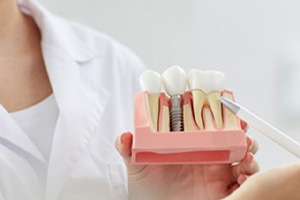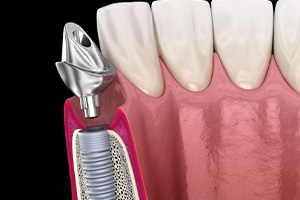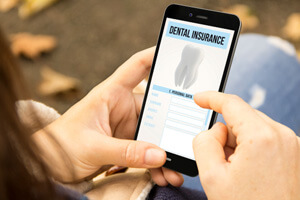Dental Implants – Buckhead, Atlanta
The Next Best Thing to Natural Teeth
When it comes to modern options for tooth replacement, dental implants are the gold standard. Because the implant posts act as artificial tooth roots, they effectively restore the entire structure of your missing teeth. As a result, they offer many benefits that traditional bridges and dentures can’t match. If you think dental implants in Buckhead, Atlanta might be the right choice for your smile, give Vason Family Dentistry of Buckhead a call today.
Why Choose Vason Family Dentistry of Buckhead for Dental Implants?
- In-House Dental Implant Placement
- Two Experienced, Highly Educated Dentists
- Natural-Looking, Long-Lasting Dental Materials
What Are Dental Implants?
An actual dental implant is a small titanium post that is made to be surgically inserted into the jawbone. Titanium is highly biocompatible and can fuse with your bone tissue through a natural process called osseointegration; this allows your dental implant to act as a strong foundation for a dental crown, a dental bridge, or a denture. The final restoration will be attached to the implant post with the help of a small metal connector piece called an abutment.
The 4-Step Dental Implant Process

While they replace missing teeth like dental bridges and dentures, dental implants will involve multiple important steps to ensure successful results. Although the treatment can take several months to finish, the benefits you can receive will make it worthwhile. On top of that, our team can perform the entire process in-house, so you won’t have to worry about visiting a dentist you don’t already know and trust. Read on to learn the four main steps for getting your lifelike dental implants.
Initial Dental Implant Consultation

At your first dental implant appointment, our team will take note of how many teeth are missing and capture X-rays of your mouth and jaw. We’ll determine whether you can get dental implants right away or if preparatory procedures are needed beforehand, such as gum disease treatment, tooth extractions, or bone grafting. If you have any underlying or developing issues present, we’ll need to address them first so that there’s less of a chance of treatment failure later on. We’ll also walk you through the process and provide an estimate of the cost so there aren’t any surprises.
Dental Implant Surgery

If you’re eligible for the treatment, we’ll pencil you down for surgery at a later date. Your dental implant surgery will involve placing the necessary number of posts in predetermined spots in the jaw. Thanks to our training, we can perform this surgery in-house without referring you to a specialist. We’ll begin by numbing your mouth with a local anesthetic to keep you pain-free. Once we’ve embedded the implants in your jawbone, we’ll suture your gums around the posts and have you rest at home to recover properly.
Dental Implant Osseointegration & Abutment

You should heal from your surgery after a few weeks. However, your dental implants will need to form a lasting bond with the jawbone after a few months. This process is known as “osseointegration,” which will create the natural-feeling foundation needed for your new teeth to function like normal ones. Once your implants have fused properly, you’ll return to our office to have your abutments attached to each post. Then you’ll be sent home again so your gums can heal.
Delivery of Dental Implant Restoration(s)

After you’ve recovered, you’ll come back to us to receive your customized dental crown, bridge, or denture. During your final implant appointment, we will attach the restoration to the post(s), putting the finishing touches on your new smile. Once we’ve verified that your bite is correct and that you’re satisfied with your new pearly whites, you’ll be free to enjoy your long-lasting results!
Benefits of Dental Implants

Have you ever wondered why so many patients choose dental implants over other tooth-replacement solutions, like dentures? Well, there are actually several reasons! In this next section, we’re covering some of the ways this state-of-the-art tooth-replacement solution improves your quality of life, oral health, overall well-being, and more.
Day-to-Day Benefits

A few day-to-day benefits that come with dental implants include:
- Varied Diet: It’s very common for patients with tooth loss to stick to a diet filled with softer foods, like oatmeal, soup, and yogurt. Unfortunately, this can get a bit boring after some time. The good news is that dental implants restore the strength of your bite, allowing you to eat a wider variety of foods to maintain a balanced diet.
- Easy Oral Hygiene: Simply put, it’s easy to take care of your dental implants since they can be brushed and flossed like regular teeth. That means that you won’t have to buy any special oral hygiene products or adopt a more cumbersome dental care regimen.
- Stability: Patients with ill-fitting tooth-replacement solutions experience difficulty chewing, speaking, and laughing with confidence since their restoration isn’t securely in place. You won’t have to worry about your dental implants slipping or falling out; they get their stability from your jawbone!
Health Benefits

Here are some of the ways dental implants benefit your health:
- Jawbone Preservation: Although there are several things that make dental implants unique, one of the most remarkable aspects of this state-of-the-art tooth-replacement option is that it is inserted directly into your jawbone. Not only does this help them look and feel more natural, but it also helps stimulate your jaw to prevent bone loss.
- Preserve Your Natural Teeth: Did you know that dental bridges sometimes require healthy enamel to be altered? Don’t worry – the same cannot be said for dental implants. Since they are inserted into your jawbone, they don’t need your surrounding teeth for support; they are self-supporting!
- Benefit Your Oral and Overall Health: In addition to preserving your natural teeth, dental implants prevent problems like dental drift. They also allow you to eat a more varied diet and improve the strength of your bite, reducing your chances of malnutrition and indigestion.
Long-Term Benefits

Below are a few of the many long-term benefits of dental implants:
- Long-Lasting: Usually, dentures last for upwards of a decade with proper care. Dental implants, on the other hand, last significantly longer. In fact, it’s common for them to last for three decades!
- High Success Rate: Dental implants have a success rate of over 95%, which is quite remarkable. This is largely due to the extensive vetting process, which includes looking at your dental and medical history as well as any medications you’re taking and the density of your jawbone.
- Youthful Appearance: Overtime, bone loss and gaps between your teeth can create a sunken-in appearance, making you look older than you actually are. The good news is that dental implants can stimulate your jawbone and fill the gaps in your smile, restoring your youthful appearance.
Who Dental Implants Can Help

Nearly every adult who is missing one or more of their teeth can benefit from dental implants. These titanium posts offer an incredibly versatile solution for tooth loss, and you can be sure to have a fully personalized treatment plan to best address your unique needs. Of course, our team will need to verify certain factors about your oral health first to determine if you’ll be eligible for the process. After confirming that you’re qualified for this treatment, we can walk you through the various ways you can regain your complete smile with dental implants.
Who is a Good Candidate for Dental Implants?

You may consider getting dental implants if you’ve lost at least one tooth. To be a candidate, you need to have enough bone in your jaw to support the posts and be in good enough health for minor oral surgery. Bone grafts and other preparatory procedures may be necessary before you can have dental implants placed. We will also need to make sure that you are free of any underlying complications that could risk failure down the road, including gum disease and cavities. Once we’ve determined that dental implants are the best choice for you, we can walk you through the steps of the procedure.
Missing One Tooth

When you’ve only lost one tooth, a single dental implant post will be placed in the gap where your tooth used to be. This post will eventually be restored with a dental crown made out of a tooth-colored material. By completely filling the space with a dental implant and crown, we can prevent the surrounding natural teeth from drifting out of their proper alignment.
Missing Multiple Teeth

We can replace multiple missing teeth simultaneously with a dental bridge and a pair of dental implants. The implant posts will be surgically placed at either end of the gap so that they can support the bridge. Implant bridges are more conservative than traditional ones since there’s no need to make any alterations to existing teeth.
Missing All Teeth

Only about four to eight dental implant posts are needed to replace an entire row of missing teeth. Implant dentures are different from traditional ones since they can be made to stay anchored in your mouth 24/7; not only can you count on them to remain firmly in place at all times, but you won’t have to remove them for cleanings.
Understanding the Cost of Dental Implants

In the world of dentistry, the cheapest solutions are often the most fleeting. Dental implants are more expensive than other tooth replacements because they last longer and offer more stability and customization. Even so, the cost can make them seem out of reach for many patients. At Vason Family Dentistry of Buckhead, we’re committed to helping you achieve the results you desire, regardless of your financial situation. Read more below to learn all you need to know about the pricing of dental implants and how our team can help you make them more affordable.
Preliminary Treatments & Dental Implant Surgery

The first major factor that will determine the overall cost of your dental implant treatment is the necessity for preparatory treatment. While almost anyone can receive dental implants, some patients need to have extractions, gum disease treatment, or bone grafting performed before they’re eligible. While these can add cost to the process, the good news is that many of them can be partially covered by your insurance. The implant surgery itself typically isn’t covered and incurs its own costs.
The Parts of Your Dental Implant

Dental implants can also vary in price because of their customizable nature. Here are some things we consider for each patient:
- The Number of Implants: One dental implant can retain one restoration, but depending on your needs, you may need multiple implants.
- Type of Restoration: A single crown is less expensive than an implanted denture that replaces an entire arch.
- Size and Material: Implant fixtures must be sized appropriately for each patient depending on their jawbone. Most implants are made of titanium, but the material can vary.
- Dental Implant Brand: Just like cars or technology products dental implants have different models and manufacturers. Some brands run a bit more expensive than others.
How Dental Implants Can Save You Money/ How Dental Implants Pay for Themselves

It’s no surprise that dentures and dental bridges are popular options because of their lower up-front cost. However, both treatments will require adjustments and replacements, creating maintenance costs that can quickly add up over time. This is not to mention special cleaners, pastes, or equipment necessary to keep them clean. Dental implants are a one-time treatment with a success rate of over 95 percent. This makes them a much more cost-effective treatment that can save you money in the long run.
Does My Dental Insurance Cover Dental Implants?

Dental implants, more often than not, are considered a cosmetic treatment by insurance providers. This means that they are hardly ever covered by most plans. However, there are exceptions. If you’re concerned about your dental insurance coverage, our team is highly knowledgeable and can help you parse through the fine print of your policy to maximize your benefits.
Making Dental Implants Affordable

While dental insurance is great to have when it comes to reducing the cost of many treatments, it doesn’t cover everything. At the same time, many patients don’t have access to it through their jobs or simply can’t afford the premiums. This is why we proudly accept CareCredit as a means of financing your dental implants. This service allows qualifying patients to pay for all their treatment costs immediately and split the balance into smaller, budget-friendly payments over time with little to no interest!
If you’re ready to change your life and save some money on your smile with dental implants, reach out to us today to schedule your consultation!
Maintaining & Caring for Your Dental Implants

After your post-op recovery, you’ll have to implement some new habits (and break old ones!) to properly care for your dental implants in Buckhead. Fortunately, dental implant maintenance is pretty simple! Here’s what we recommend:
Make Oral Hygiene a Priority

Since you’ve contributed a lot of time, money, and effort to receive your dental implants, we’re guessing you’d rather not lose them to a preventable oral health condition. That means it will be more important than ever to brush your teeth twice daily and floss at least once per day. If oral bacteria build up were to cause gum disease, your implants could fall out.
Eat a Healthy Diet

Sugar is known to accelerate bacteria growth, so if you’d rather avoid gum disease-related complications, it’s best to limit your sugar intake. Eating foods high in vitamin D and calcium, on the other hand, will help promote jawbone growth.
Break Bad Habits

Do you use your teeth as tools? Or bite your nails when you’re nervous? Habits like these aren’t always easy to break. However, they can contribute to premature wear and shorten the lifespan of your implants. Steering clear of such habits is well worth the effort!
Protect Your Dental Implants

Dental implants might be durable, but they’re not quite as resilient as natural teeth. If you play a sport or enjoy an activity that warrants protecting your teeth with a mouthguard, you should do the same for your dental implants!
You may also have to guard your new smile from yourself. Some patients grind and clench their teeth at night and don’t even realize it. This can also cause premature wear and can fortunately be treated with a special nightguard.
Schedule Regular Dental Checkups

It’s a good idea to visit our office about every six months for a checkup and professional cleaning. With our special skills and tools, we can remove harmful plaque and tartar that’s difficult to eliminate at home. Regular checkups, meanwhile, give us the chance to check on your restoration and monitor your oral health. If we notice anything strange, we can address the issue promptly, before it has the chance to become more complex!
Dental Implants Post-Op Instructions

Once your dental implants are placed, you’ll need to heal for a while. The good news is that Vason Family Dentistry can help with your recovery! With our dental implant post-op instructions in Buckhead, you can trust your mouth to heal smoothly and easily. The result will be a restored grin you can enjoy without major challenges. If you’d like to learn more, just keep reading or contact us in the coming days.
What to Do Directly After Dental Implant Surgery

You mustn’t touch the forming blood clot after your dental implant surgery; that’d delay or reverse your recovery. Instead, please follow these key rules:
- Keep your fingers and tongue away from the surgical site(s) for a few days.
- In the first 24 hours after surgery, avoid using tobacco products.
- Don’t use drinking straws while you recover; their suction can dislodge a blood clot.
Common Side Effects When Recovering from Dental Implant Placement

For a brief period after surgery, many patients tend to experience side effects. These include:
- Facial or Gum Swelling – During the first 72 hours after surgery, your face and gums may swell. Should that happen, apply a cold compress or ice pack.
- General Discomfort – Your treatment site may ache when your surgery’s anesthesia wears off. In that case, store-bought pain relievers should be used to ease symptoms.
- Intermittent Bleeding – Please apply gauze and light pressure as needed if your implant site bleeds post-placement.
Note that the above effects are short-lived; they quickly fade with time. However, please let us know if they persist in your own case.
Your Diet After Dental Implant Surgery

Chewing tough meals too soon could dislodge your blood clot, so follow a soft food diet for a few days after surgery. You’ll otherwise face recovery delays.
Potential foods to include in this diet are:
- Scrambled Eggs
- Smoothies
- Pudding
- (Non-hot) Soup
- Mashed Potatoes
- Sweet Potatoes
- Yogurt
- Soft Cheese
- Pasta
- Ice Cream
You should be able to resume a “normal” diet once you feel up to it. That said, continue to limit crunchy and tough foods going forward. You also shouldn’t chew directly on the implant site(s).
Post-Op Health & Oral Hygiene

Even as you recover from surgery, you must clean your mouth every day. That means you should do the following while you heal:
- Be careful of your surgical site when brushing your teeth twice daily.
- Rinse your mouth with salt water twice a day to clean the treatment site. (If you want, you could also substitute a prescription mouthwash for the salt water.)
- Avoid mouthwashes with a high level of alcohol (i.e., Scope, Listerine, etc.).
What to Do After Your New Teeth Are Attached

When your dental crown, bridge, or denture is attached to your implant, your treatment’s hardest part is over. The most you’ll feel from that point is some minor (and easily managed) gum sensitivity. In other words, don’t expect to experience any further swelling, bleeding, or demanding recovery steps. You can simply enjoy your restored smile once the attachment is done!
Dental Implant Failure and Salvage

Even though dental implant failure doesn’t happen very often, it’s definitely worth being prepared for the worst-case scenario. As soon as you realize that your dental implants feel loose or are causing unusual pain, reach out to our team immediately to schedule an appointment. The sooner we can examine your mouth, the sooner we can determine what caused your dental implants to fail and start putting together a salvage plan to protect your newly re-completed smile.
Learn More About Dental Implant Failure and Salvage
Dental Implant FAQs

By now, you may be considering dental implants in Buckhead, Atlanta. That’s only natural – these prosthetic teeth are amazing! However, you’d be wise to learn more about them first. You’ll feel more confident about the treatment process that way. Luckily, we at Vason Family Dentistry of Buckhead can help: the answers to some popular dental implant questions are listed below. By reading them, you’ll understand how the restorations work. If you need further details, don’t worry; just call our office to learn more!
How Long Have Dental Implants Been Around?
Technically, the oldest evidence of dental implants goes back centuries. Archaeologists have even found Mayan skulls with seashells and carved stones used as replacement teeth. Those artifacts have been dated to roughly 600 A.D., though undiscovered items could have earlier roots.
As for modern dental implants, their history starts in the early 1950s. At that time, a Swedish orthopedic surgeon made a rather startling discovery. Namely, he couldn’t remove a small titanium cylinder he had placed in a bone. People then grasped that titanium could fuse with the jawbone. From there, early versions of today’s implants began seeing use in the 1970s onward.
Do I Need a Bone Graft Before Getting Dental Implants?
In fact, there’s a chance you’ll need a bone graft before implant treatment. Whether you do or don’t will depend on the state of your oral health.
You’ll likely require a bone graft if your jawbone has atrophied from tooth loss. Dental implants require a solid jaw to fuse correctly. Without one, the prosthetic teeth will fail soon after their placement. In contrast, the bone graft would strengthen your jawbone by transplanting bone tissue.
Ultimately, however, your dentist will make the final call. They’ll take detailed scans of your jaw area to see if your jawbone has greatly eroded. Based on their findings, they and their team will decide if bone grafting is needed.
Do Dental Implants Make You Look Younger?
To be honest, yes – dental implants do make you look younger. Their features ensure treatment results include a more youthful face.
If you don’t already know, teeth stimulate your jawbone. Consequently, losing even a few will cause your jaw to erode and shrink. This erosion then causes facial collapse – a condition that ages your face, making it more wrinkled and sunken.
Still, dental implants prevent and even reverse facial collapse. They act as substitute teeth that stimulate your jawbone. As a result, they prevent the bone atrophy that makes you look older.
Will People Be Able to Tell That I Have Dental Implants?
Generally speaking, people won’t notice that you have dental implants. The prosthetics seem so natural that they look almost exactly like regular teeth.
Firstly, remember that implants are custom-made. Your dentist takes dental impressions, so they’ll be personalized. Therefore, placed implants will blend seamlessly with the rest of your smile.
Furthermore, implants act like the real deal. They fit into your jaw sockets like natural tooth roots. It’s thus the case that they won’t slip like dentures might. Instead, they’ll be secure, stable and let you speak and eat easily.

